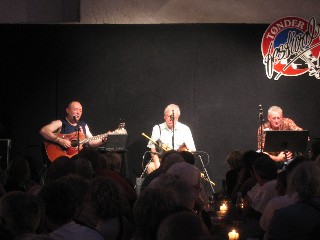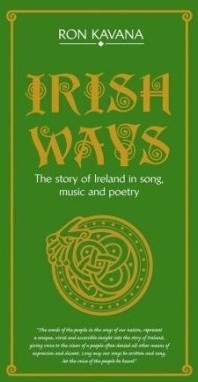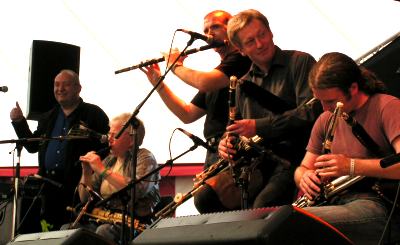
FolkWorld Issue 35 02/2008; Live Report by Walkin' T:-)M
For many years, Irish singer, songwriter and multi-instrumentalist Ron Kavana co-managed the Sunday afternoon ceilidh at Tønder's annual folk festival. His song "Reconciliation" has been sung in Tønder ever since. Recently Ron added author and historian to his curriculum vitae, and presented his program 'Irish Ways' at Tønder's Visemøllen. His/story according to Ron Kavana.
Much of what has been written in weighty tomes in the name of history is mere fabrication, unworthy of the paper it was printed on, says Ron Kavana, while short, simple lines in song lyrics often offer a rare insight into what may be the real 'truth' of a particular story.

|
|
The page may be lost and the pen long forsaken And weeds may grow wild o'er the brave heart and hand But ye are still left when all else has been taken Like streams in the desert, sweet songs of our land |
Since nobody seems to has attempted to present the complete story, he felt compelled to take up the gauntlet. Ron Kavana presents an overview of Ireland's history through traditional songs, poetry and music he has heard in his lifetime alongside with songs he has written. He is starting with the first humans who settled in Ireland around 7,500 BC and is acquainting his audience with the Norman conquest, the Penal Laws and various Irish revolutions, the Great Hunger, emigration, diaspora and the War of Independence.
Laptop in front of him, Ron reads extended passages from his recently published book and cd box 'Irish Ways - the Story of Ireland in Song, Music and Poetry'. The historical narration is interrupted by songs and music. So Ron has a satirical song about the Irish patron saint St. Patrick (who probably was a Welshman):
|
St. Patrick, though you were a Taff, to us you're still a Paddy When we celebrate your name now from New York to Glenamaddy He got rid of all the snakes and most of all the other vermin Except for all the slimy rats who occupy Dáil Éireann |
Many of the songs are songs of a bygone era, Ron muses, taught in schools in a less sensitive age, or popularised by ballad groups in the Folk Revival of the '50s and '60s but now out of favour with more commercially-minded, traditionally purist, and/or 'politically correct' artists of today.

Ron Kavana : Irish Ways - The Story of Ireland in Song, Music and Poetry, Proper Records, PRDP4001. |
P.J. McCall's "Follow Me Up To Carlow" has been set to a tune said to have been played after the defeat of Lord Deputy Grey's troops at Glenmalure in 1580, thus being one of the oldest surviving tunes in the Irish repertoire. Ron is cursing Oliver Cromwell, England's Lord Protector and Ireland's rapist, in "Young Ned of the Hill." The song has been recorded by The Pogues (-> FW#22, FW#30), and is also featured in the Ken Loach film "Hidden Agenda," where Ron Kavana and Terry Woods (-> FW#15) give a performance in a Republican club in West Belfast.
Ron explains: Róisín Dubh, Kathleen Mavourneen, Cathleen Ní Houlihainn etc., are among the many female names used by poets and songwriters to describe Ireland. The choice of female names is typical of oppressed races which tend to view themselves as matriarchal, while conquering races such as the British and Germans present themselves as patriarchal and are represented by male names such as John Bull or refer to their country as the Fatherland.
However, Ron Kavana is no preacher of vengeance and hatred. He wishes that friendship and honour would flourish both sides of the Boyne. His statement about the troubles is included in "Truth and Understanding," written by Ron and County Derry man Gino Lupari (Four Men and a Dog -> FW#32, FW#35):
|
Let reconciliation be our watchword for the future Let's build a bridge of peace to stand for coming generations Don't go back to how it was, to killing men for freedom's cause Observe our common Christian laws of truth and understanding |
The Irish famine of the 1840s caused mass emigration, and Ron has his share of songs from and about the Irish diaspora: a re-write of the traditional "Bound for South Australia", as well as "The Plains of Emu" by Presbyterian minister John McGarvie (-> FW#28).
Ron is strolling in the past, but not dwelling. I sometimes wonder if on winning independence, we shouldn't have levelled Dublin and started from the scratch with rebuilding our nation. A stroll around central Dublin can be a depressing exercise, but the bottom line is that we cannot and must not dwell in the past.
|
We're an awful lot for cryin' over things that are long gone Forget about Tiocfaidh Ár Lá, our day is here and now We must embrace it with bold courage, show no uncertainty or fear Take our place amongst the nations, let our martyrs rest in peace |
Ron is reading and singing, he plays guitar and bouzouki. Mick Coyne is at the uilleann pipes, Dave Hennessy on button accordion and Mike O'Connor on bodhran.

|
An hour is much too short and Ron hastens through his/story. Not every song that I mention here has really been performed at the Visemøllen concert, I confess. Search out the 'Irish Ways' box set which features five hours of music and narration.
It is said that the English king Henry VIII introduced a statute to end the activities of Irish rhymers, pipers and bards, the trustees of Ireland's cultural heritage. Elizabeth I, contrary to Hollywood's likeable depiction, decreed that bards and harpers were to be executed whenever found.
Irish music hasn't disappeared though. Thanks to Ron Kavana and other bards, rhymers, pipers and harpers throughout the ages.
|
There are those who are certain that drinkin' and courtin' are the sure ways to hell and damnation But if that is to be, it would seem unto me, that their god has no sense of occasion Fill up your glass that future and past harmony be determined There's more friendship poured out in a bottle of stout than you'll find in statute or sermon |
Photo Credits:
(1) Ron Kavana (by Walkin' Tom, Tønder Festival 2007);
(2) Ron Kavana: Irish Ways - The Story Of Ireland In Song, Music And Poetry (by Proper Records);
(3) Alias Ron Kavana @ Folk Festival Wolfenbüttel 1997;
(4) Tønder Ceilidh @ Tønder Festival 2004 (by the Mollies).
|
To the German FolkWorld |
© The Mollis - Editors of FolkWorld; Published 02/2008
All material published in FolkWorld is © The Author via FolkWorld. Storage for private use is allowed and welcome. Reviews and extracts of up to 200 words may be freely quoted and reproduced, if source and author are acknowledged. For any other reproduction please ask the Editors for permission. Although any external links from FolkWorld are chosen with greatest care, FolkWorld and its editors do not take any responsibility for the content of the linked external websites.
